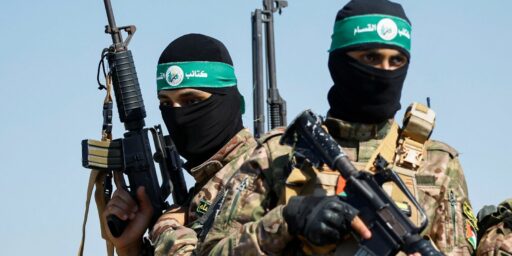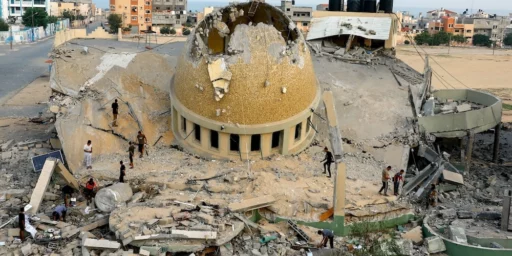Legal Limbo for Civilian Contractors in War Zone
Legal limbo shadows civilians in war zone (Washington Times, p.1)
(amusing, it’s mistyped as “Legal limbo shadows civilian sin war zone”)
The record number of civilians hired to work in war zones since September 11 is sparking heated debate over just how far the United States can go to achieve what some are calling “the civilianization of the battlefield.” The Pentagon says about 20,000 civilian contractors are driving trucks, serving food and conducting other duties in Iraq. But lawyers and representatives from contract firms gathered for a conference here last week put the number closer to 80,000. “Nobody really knows the exact number,” says Jeffrey Addicott, head of St. Mary’s University’s Center for Terrorism Law, which hosted a symposium, “Contractors on the Battlefield.” “The Pentagon likes to go with a lower number, but they’re not counting the large number of security personnel hired to provide security for civilian contractors building bridges, roads and providing transportation,” says Mr. Addicott, who estimates that as many as 100,000 are in Iraq and Afghanistan.
The contractors work in an uncharted legal universe, say military and legal scholars, who note many are armed and on the front lines, but are neither protected nor governed by the same military laws as troops. The rules are “vague” for contractors, says Geoffrey S. Corn, international-law adviser to the U.S. Army’s Office of the Judge Advocate General (JAG). “The ultimate issue is what are you allowed to let civilians do in war in support of your force in accordance with the law of war or international law,” he says.
Lawmakers in Washington have proposed the Contractors on the Battlefield Regulatory Act, which calls for a formal accounting of the number of contractors and stricter guidelines on how they can be used and what sort of training their companies and the Defense Department must provide them.
Contractors fall into three categories, says Darrell Phillips, chief of the international and operations law division of the Air Force JAG. Some maintain helicopters and other privately built equipment used by the military, some transport fuel and food, and others — often locally hired — help with construction projects. Many are retired military personnel drawn to pay that often tops $100,000 a year, considerably higher than that for troops. A separate category is reserved for private security and private military companies, such as Blackwater Security Services, whose employees carry weapons to guard aid workers, diplomats or other civilian contractors. Mr. Phillips, who spoke at last week’s conference, says military officials are authorized to decide who can carry weapons in Iraq, and the Defense Department attempts to keep track by issuing “weapons cards.”
Some military officials say the Pentagon depends on contractors without defining limits on how they can be used, how they must be trained and what they’re legally permitted to do. “The dirty little secret is, these guys are immune to any laws,” said one Marine Corps officer who spoke on the condition of anonymity. The officer said that when they violate security, “you can’t do anything about it … the only thing you can do is kick them off your base.”
That apparently was the case with 19 security contractors who butted heads with the Marines in Fallujah in late May. The Marines, who say the employees of North Carolina-based Zapata Engineering fired on them and civilians, detained the contractors for three days before taking their weapons and vehicles and releasing them in Baghdad. The contractors say they were mistreated while in custody and deny having shot at the Marines.
Under U.S. and international laws of war, “any civilian who engages in offensive armed conflict is committing a war crime,” says Mr. Addicott. Such laws bolster the Bush administration’s use of the term “illegal combatant” to describe Taliban and al Qaeda fighters who ignore the Geneva Conventions by, among other things, dressing as civilians. For civilians paid by the Defense Department to carry weapons but not to wear uniforms on the U.S. side, Mr. Addicott says, “The point of controversy is where the line exists between offensive and defensive operations. “Civilian contractors can defend themselves if attacked, but they’re prohibited from engaging in offensive operations,” he said. “DOD and contracting firms are pressing the envelope in a manner that is getting closer and closer to offensive operations, in part because they don’t have enough military personnel to … sustain operations.”
The nature of the problem is not new; there has been much discussion in both the mainstream press and the blogosphere of this topic since early in the war, most infamously with Kos’ “screw them” remarks about the murder of four Blackwater contractors. The scope of the problem, though, is apparently getting bigger all the time.






You don’t know the half of it. Most of the jobs being done by these contractors – maintenance, transport, personal security, etc – would have to be done by US troops if the contractors weren’t there. So we have two additional issues:
– Pouring more money into contractors allows us to keep the number of uniformed troops (articficially?) low, but
– If the security situation gets too rough for even 6-figure salaries to convince contractors to go there, those jobs will suddenly be dropped on the already-stretched uniformed contingent.
I think it’s amazing (but not entirely unsurprising) that nobody has even a vague idea of how many contractors are in Iraq, since counting them would mean also counting all the extra US troops that would be needed in-country if they left…